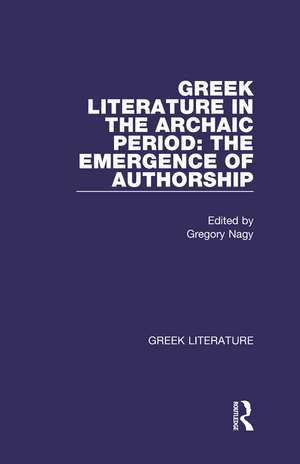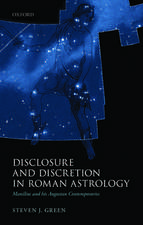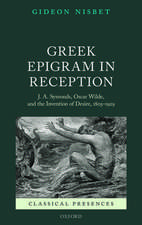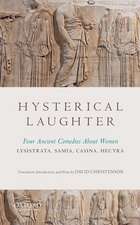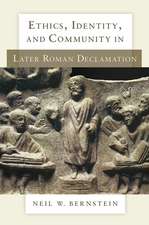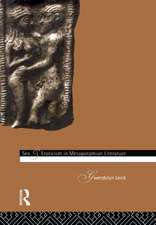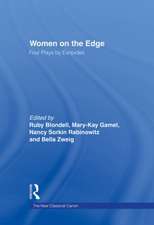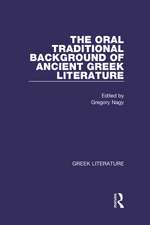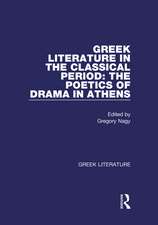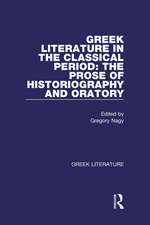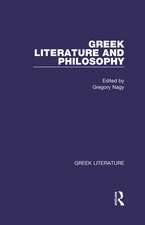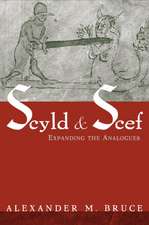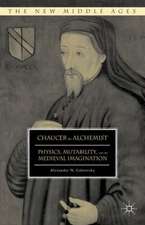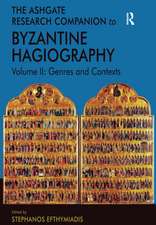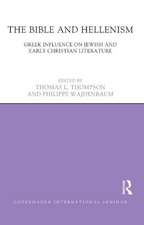Greek Literature in the Archaic Period: The Emergence of Authorship: Greek Literature
Editat de Gregory Nagyen Limba Engleză Hardback – 21 dec 2001
Preț: 894.39 lei
Preț vechi: 1090.72 lei
-18% Nou
Puncte Express: 1342
Preț estimativ în valută:
171.16€ • 185.86$ • 143.78£
171.16€ • 185.86$ • 143.78£
Carte tipărită la comandă
Livrare economică 22 aprilie-06 mai
Preluare comenzi: 021 569.72.76
Specificații
ISBN-13: 9780815336846
ISBN-10: 0815336845
Pagini: 314
Dimensiuni: 152 x 229 x 23 mm
Greutate: 0.54 kg
Ediția:1
Editura: Taylor & Francis
Colecția Routledge
Locul publicării:Oxford, United Kingdom
ISBN-10: 0815336845
Pagini: 314
Dimensiuni: 152 x 229 x 23 mm
Greutate: 0.54 kg
Ediția:1
Editura: Taylor & Francis
Colecția Routledge
Locul publicării:Oxford, United Kingdom
Notă biografică
Gregory Nagy is Professor of Classics at Harvard University and Director of the Center for Hellenic Studies in Washington, D.C. He has written and edited numerous books on Greek literature, including Homeric Questions, The Everyman's Library The Iliad, Greek Mythology and Poetics, and Poetry as Performance.
Cuprins
Carson, A. The Burners: A Reading of Bacchylides' Third Epinician Ode. Phoenix 38 (1984). Clay, D. Fragmentum Adespotum 976. Transactions of the American Philological Association 101 Compton, T. The Barbed Rose: Sappho as Satirist. Favonius 1 (1987). Dougherty, C. Archaic Greek Foundation Poetry: Questions of Genre and Occasion. Journal of Hellenic Studies 114 (1994). Felson, N. 1999. Vicarious Transport: Fictive Deixis in Pindar's Pythian Four. Harvard Studies in Classical Philology 99 (1994). Harvey, A.E. The Classification of Greek Lyric Poetry. Classical Quarterly 5 (1955). Heath, M. Receiving the Kômos: The Context and Performance of Epinician. American Journal of Philology 109 (1988). Hubbard, T.K. The Theban Amphiaraion and Pindar's Vision on the Road to Delphi. Museum Helveticum 50 (1993). Kurke, L. Pindar's Sixth Pythian and the Tradition of Advice Poetry. Transactions of the American Philological Association 120 (1990). Miller, A.M. Pindar, Archilochus and Hieron. Transactions of the American Philological Association 111 (1981). Petropoulos, J. Sappho the Sorceress--Another Look at Fr. 1 (LP). Zeitschrift für Papyrologie und Epigraphik 97 (1993). Power, T.C. A Chorus of Parthenoi in Bacchylides 13. Harvard Studies in Classical Philology 100 (2000). Rosen, R.M. Hipponax, Boupalos, and the Conventions of the Psogos. Transactions of the American Philological Association 118 (1988). Schein, S.L. Unity and Meaning in Pindar's Sixth Pythian Ode. METIS: Revue d'Anthropologie du Monde Grec Ancien 2 (1987). Segal, C. Messages to the Underworld: An Aspect of Poetic Immortalization in Pindar. American Journal of Philology 106 (1985). Sfyroeras, P. Fireless Sacrifices: Pindar's Olympian 7 and the Panathenaic Festival. American Journal of Philology 1993 (1993). Sider, D. The Blinding of Stesichorus. Hermes 117 (1989). Slater, W.J. Futures in Pindar. Classical Quarterly 19 (1969). Stehle, E. Help me to sing, Muse, of Plataea. Arethusa 29 (1996). Wickersham, J.M. The Corpse Who Calls Theognis. Transactions of the American Philological Association 116 (1986). Yatromanolakis, D. Simonides Fr. Eleg. 22 W2: To Sing or to Mourn? Zeitschrift für Papyrologie und Epigraphik 120 (1998). List of Recommended Readings
